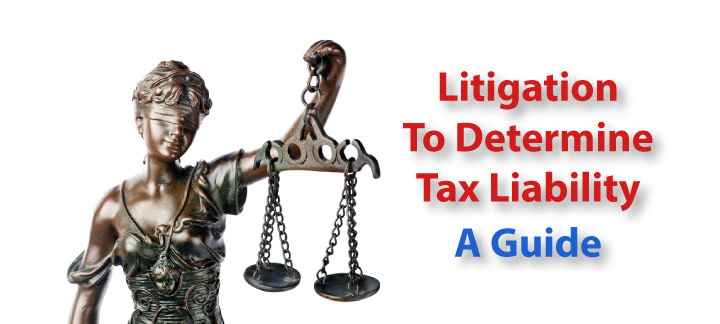Deficiency Litigation to Determine Tax Liability
There are two principal types of tax litigation process that can be used to determine a tax liability: deficiency litigation and refund litigation. Deficiency litigation is one type of tax court litigation employed to determine a taxpayer’s tax liability. The purpose of a deficiency litigation is to give the taxpayer an opportunity to dispute the IRS’s assessment of tax liability against the taxpayer. It typically takes place in Tax Court and the sole jurisdictional requirement is that the taxpayer receive a statutory notice of deficiency identifying a proposed tax. Prior payment of the deficiency is not required to litigate in Tax Court.
Statutory Notice of Deficiency
In order to conduct a deficiency litigation challenging the Commission’s determination of tax deficiency in Tax Court, the taxpayer must have first received a statutory notice of deficiency. The statutory notice of deficiency is also known as the “90 Day Letter” and after receipt, the taxpayer must file a petition for redetermination in Tax Court within 90 days. Once the taxpayer files the petition for redetermination, the Tax Court acquires exclusive jurisdiction over the matter for the time period in question. This conferral of jurisdiction means that the taxpayer may not later withdraw his or her Tax Court petition and attempt to litigate the matter in district court or Court of Federal Claims. If the taxpayer does not file the petition for redetermination within the 90 day period, then the Tax Court cannot obtain jurisdiction over the controversy.
Payment of Tax is Not Required in Tax Court
Unlike other jurisdictions, payment of tax is not required for jurisdiction in Tax Court. In a deficiency litigation, payment is not required until after the Tax Court’s determination has been entered and is final. However, it is important to note that interest will continue to accrue on the proposed deficiency amount before a final determination by the Tax Court. The interest accrues and compounds daily. This factor might encourage the taxpayer to pay the proposed tax before the final determination of the Tax Court, in order to prevent the continued accrual of interest. If the taxpayer wishes to stop the accrual of interest, yet still retain the jurisdiction of the Tax Court in a deficiency litigation, several options are available:
- The taxpayer may make a deposit in the form of a cash bond before receiving the statutory notice of deficiency to prevent the interest from accruing; or
- The taxpayer may make a payment of the tax in full after the issuance of the statutory notice of deficiency in order to prevent any further accruals of the interest.
What Happens if the Tax Court does not Have Jurisdiction?
If the taxpayer fails to properly file a petition for redetermination with the Tax Court, the Internal Revenue Service will assess and collect the proposed tax deficiency. At this point, the taxpayer must pay the proposed tax deficiency. If the taxpayer still wishes to contest the amount, he or she can still file an administrative claim for refund, but only after paying the tax deficiency. The administrative claim for refund must be filed before the later of:
- Three years from the date the return was filed; or
- Two years from the date the taxpayer pays the proposed deficiency amount. (1)
Location of the Deficiency Litigation
Once the taxpayer files his or her petition with the Tax Court, he should simultaneously file a Designation of Place of Trial, which indicates the taxpayer’s preference for trial location. The Chief Judge attempts to schedule the taxpayer’s trial at a location and time most convenient for the taxpayer. The case will be set for trial only after the IRS Commissioner has filed his or her answer, which should occur within 60 days of the filing of the petition by the taxpayer. In most cities, cases are calendared within 5 months after the answer has been filed.
How a Tax Attorney Can Help with Your Tax Litigation
If you are contemplating a deficiency litigation, then you must consult with an experienced tax litigation tax attorney. San Diego Tax Attorney William D. Hartsock has been successfully helping clients with criminal tax issues since the early 1980s. Mr. Hartsock offers free consultations with the full benefit and protections of attorney client privilege to help people clearly understand their situation and options based on the circumstances of their case. To schedule your free consultation simply fill out the contact form found on this page, or call (858) 481-4844.
Tax Law References:
- IRC § 6511(a).



Comments (0)